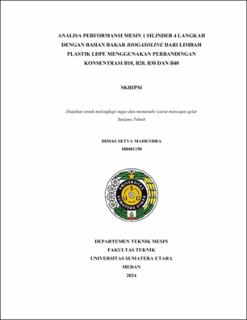| dc.description.abstract | The increasing population and economic growth in Indonesia have significantly raised
the amount of plastic waste, posing a substantial environmental problem. Various
types of plastics, including LDPE, are commonly used in everyday items such as
packaging and containers. The uncontrolled disposal and burning of plastic waste
contribute to environmental pollution and health hazards. One promising solution to
mitigate the impact of plastic waste is pyrolysis, a process that thermally decomposes
polymer materials in the absence of oxygen, yielding valuable products like oil, gas,
and charcoal.This study investigates the performance of a single-cylinder, four-stroke
engine using biogasoline derived from LDPE plastic waste through pyrolysis. The
research compares different concentrations of biogasoline blends (B10, B20, B30, and
B40) with pure gasoline. Key performance metrics analyzed include power, torque,
specific fuel consumption, thermal efficiency, and exhaust emissions (HC, CO, CO2,
and O2).The results show that the pyrolysis process effectively converts LDPE plastic
waste into biogasoline. The performance tests indicate that biogasoline blends can
serve as a viable alternative fuel, with varying impacts on engine efficiency and
emissions depending on the blend ratio. The study provides insights into the potential
of using plastic waste-derived biogasoline to reduce plastic pollution and dependence
on conventional fuels. | en_US |


